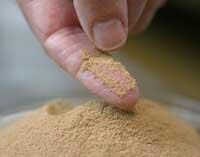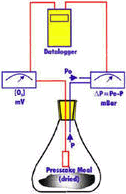 Natural or synthetic antioxidants in fish feed? Photo: Frank Gregersen, Fiskeriforskning. |
Away from synthetic additives
Fiskeriforskning was selected to conduct analyses of natural and synthetic antioxidants on assignment from Naturland in Germany. The results show that the natural additives are almost just as effective as the synthetic, which are used extensively in the industry today.
One of these synthetic antioxidants is ethoxyquin (EMQ), which is prohibited for use in foodstuffs in the EU, Japan and Canada. However, it is permitted for use in animal feed.
"Use of legal quantities of synthetic antioxidants are not proven to be dangerous for humans", says Senior Scientist Jan Pettersen who has carried out the analyses, "but there are enough alternative natural compounds that can be used in the production of fish feed".
Works in different areas
 Measuring pressure and oxygenlevels. Figure: Jan Pettersen, Fiskeriforskning. |
For example, the tests showed that ethoxyquin is effective in stopping the oxidation in fishmeal, but has insignificant effect on fish oil.
The report stresses that additional research is necessary to document how the nutritive value in feed is affected by use of the antioxidants, and whether there are health-related problems associated with these additives.
The analyses are done on assignment from Naturland and the project is financed by Coop Naturaplan Fund in Germany.
Source: Fiskeriforskning - March 2006

